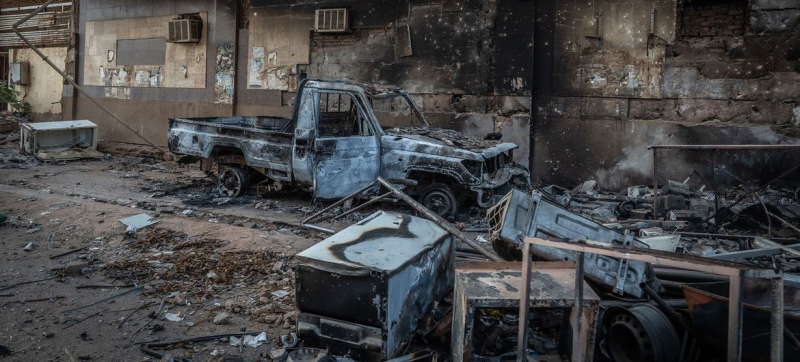- Guterres Urges Action as Peace Remains Elusive in a Fractured World |
- Why inclusion matters for tackling corruption |
- JS polls to be held by February 15: Shafiqul Alam |
- Myanmar Faces War, Disasters, Hunger, and Mass Displacement |
- UN Warns Israeli Doha Strike Risks Regional Escalation |
From Aid Worker to Refugee: Adam Ibrahim’s Sudan Journey

Destroyed vehicles outside Fedal Hospital in Khartoum, Sudan.
Adam Ibrahim was working with the UN humanitarian agency OCHA in Sudan when conflict between rival armed forces erupted in early 2023, forcing him to become a refugee alongside thousands of others fleeing ongoing violence.
Sudan faces one of the world’s largest humanitarian crises, with over 30.4 million people—more than half the population—urgently needing aid. Yet the 2025 Sudan Humanitarian Needs and Response Plan remains severely underfunded, with only 13.3 per cent of required resources received.
Forced to flee with his family as the war intensified, Mr. Ibrahim later returned to help people affected by the conflict in Darfur. Ahead of World Humanitarian Day on 19 August, he recounted his journey from aid worker to refugee and back.
“I was at home helping my daughter revise for her grade six exams when heavy gunfire suddenly shattered the silence in my hometown, Zalingei, the capital of Central Darfur state, still gripped by insecurity and shortages of basic services. At first, I thought it would pass quickly. I rushed to stock up on food and water for six days, but the streets became battlegrounds. All I could do was keep my family safe,” he said.
Despite the chaos, he continued to work. Electricity and internet were sporadic, but he kept his phone charged to send daily updates to the OCHA Head of Office, which gave him purpose amid uncertainty. Eventually, it became too dangerous to stay.
On the 39th day, his family of ten began a harrowing journey with no clear destination, driven only by the need to escape. They first reached Nyala in South Darfur, then Kosti in White Nile State, before crossing into South Sudan and eventually Uganda—a country known for stability and good schools. The 23-day journey was complicated by the lack of passports and absence of refugee camps for Sudanese nationals.
Migration authorities in both countries were supportive. In Kampala, they rented a house and received asylum status within three days. “When I held our refugee cards, I exhaled deeply and thought, ‘We’ve made it,’” Adam recalled. He enrolled his children in school and began working online, finally finding some stability.
Months later, he faced a difficult decision: stay with his family or return to Darfur to continue his work. Choosing duty, he returned to Zalingei, leaving his family in Uganda for their safety.
He found his hometown changed. Buildings bore bullet scars, another family was sheltering inside his house, and windows and belongings had vanished. Armed children and traumatized residents made everyday life tense.
Soon, he was called to El Geneina in West Darfur, devastated by violence. Streets were littered with burned-out military vehicles, and armed men patrolled in pickup trucks mounted with machine guns. The humanitarian needs were immense: people lacked food, shelter, household essentials, healthcare, clean water, and protection.
Funding cuts from donors worsened the crisis, forcing many organizations to scale back operations. Despite the challenges, between 2023 and 2025, Adam and his OCHA colleagues reached over 800,000 displaced people in West and Central Darfur. He also coordinated cross-border convoys from Chad, delivering food, medicine, and supplies to cut-off communities.
Today, Adam remains in Sudan, while his family lives in Uganda. He visits them once a year, enduring the pain of separation while continuing to serve those in need.

